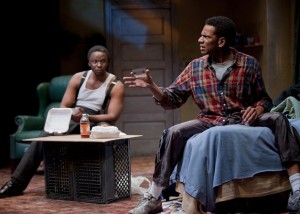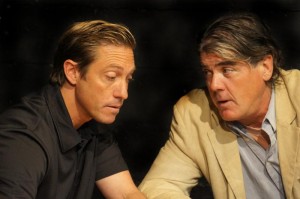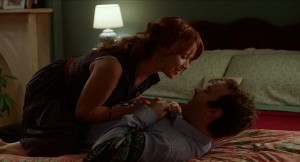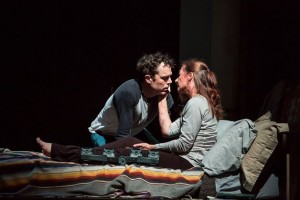Lohengrin
SF Opera Performance, October 20, 2012
The concept of love put forward in Lohengrin is that of a fragile flower very dependent upon maintaining illusions. Love is equivalent to blind Faith in goodness and constancy that must be absolute and unquestioning. But the underlying anxieties of this kind of naive faith ultimately undermine it and do it in. Lohengrin echoes Christianity in its demand for simple faith and the basic concept of a man is sent from God to rescue a damsel in distress, accused of a terrible crime. He saves her, not through self sacrifice, as in the Christian model, but through militaristic combat — a Wagnerian variant on the Christian theme. Superior prowess on the battlefield saves the girl from her enemies and wins her love. The woman’s love is the hero’s reward for her rescue from desperation. But there is one condition. The woman cannot ask her rescuer who he is or where he comes from. She has to take him completely on faith and let his actions of rescue and his superior strength in battle be the sole foundation of her devotion and love. If she is to question him and demand to know more of who he is, then he will be forced to leave her and renounce her. It is love founded on the most narrow, simplistic grounds and maintained with a gun pointed at the woman’s head, so to speak. Love can only be maintained with the woman in a desperate position of neediness with the man serving as the heroic figure of strength who magnanimously saves her from perpetual impending catastrophe. Love as worship of the conquering hero. While a woman may feel grateful to be delivered from impending doom — at least for a time — she will soon feel the extreme vulnerability of this position of helpless dependence, as the opera demonstrates. She will question her own worthiness of the man’s continuing love, she will want to broaden the base of the relationship and feel more appealing to the man beyond mere helplessness and need. She will feel the fragility of the connection to him. She feels vulnerable to his tiring of her and moving on. She seeks to strengthen her position through a greater understanding of the man, who he is, and what his own needs and vulnerabilities are. The message of Lohengrin is that this is a destructive tendency, that love can only be this primitive, blind devotion stemming from a condition of imminent undoing. Love between a man and a woman essentially depends on a woman being in a perpetual state of crisis. But on the other hand, if the woman gets to know who the man is and where he comes from, then she will realize that he is not the invulnerable hero, not the idealized figure of goodness and strength that he presented himself to be, and thus her love and devotion will be annuled. The man’s insecurity and feelings of unworthiness are activated upon a deeper probing of his true self. It is a very pessimistic outlook on relations between the sexes. Love can only be born and continue within these very narrow confines of faith sustained through willful ignorance, and that fragile foundation gives rise to the anxieties and demands that sabotage and destroy it. It is an outlook on life that is essentially dark and tragic — and a little silly too.
A few quibbles with the San Francisco Opera’s performance.
This production of the opera is set in a modern context in modern costumes, although Wagner’s original conceptualization set it in 10th century Saxony. On the cover of the program is a photograph by Erich Lessing of the destruction of the Stalin monument in Budapest, Hungary, during the Hungarian Revolution of 1956. The idea according to Director Daniel Slater is that a contemporary setting would make it “more exciting and relevant for the audience.” Well, most Americans living today can probably relate to the Hungarian Revolution of 1956 about as well as they can relate to 10th century Saxony. Many of us would be surprised to discover that there was a revolution in Hungary in 1956. And where is Hungary, by the way?
There are some militaristic and nationalistic elements in the opera that resonated well with the National Socialists, but you have to keep in mind that Germany did not even exist as a unified nation at the time this opera was composed. Invasion from the East was a long standing European fear that would be readily grasped by any European audience. The fact that this was a pressing matter in the 10th century would not be peculiar to that time or have any compelling significance as a factor in setting the opera in that time and place. I think Wagner’s purpose in setting the opera long in the past, aside from these nationalistic overtones, was to give the opera a context where the kind of romantic idealizations in the personal sphere that the opera treats would have traction for the viewer free from the distractions of a contemporary political and social context. Moving it forward in time and bringing up contemporary political issues in my view disrupts the essential focus of this opera on the nature of human relationships. True, the opera takes place under the threat of impending war. But this was a condition of European life as far back as one cares to look. So in that sense it did not matter when the opera was set, this background factor of imminent war was going to remain a constant in whatever time period it occurred. Wagner set it long in the past precisely to expunge the contingencies of the immediate contemporary circumstances. Bringing the opera forward and setting it in our own time defeats that artistic purpose and makes the whole thing sort of confusing.
Director Slater sees Lohengrin as a problematic character who renounces his godlike status in order to experience human love with Elsa. This is based on musings external to the opera itself. Within the opera there is nothing problematic about Lohengrin. He was sent on a mission by the Grail. He fulfilled the mission, he accepted Elsa as his prize, he accepted the leadership position as a warrior, he laid out his conditions, and he stuck to them steadfastly and departed without any apparent signs of misgiving. Slater says he is seeking redemption through Elsa’s love and is willing to sacrifice his immortality to achieve it. There is nothing in the opera to substantiate this view. Within the opera, Lohengrin is a knight in shining armor coming to the rescue of a damsel in distress and then to lead an army into battle. Slater puts him instead in a leather trench coat, which tends to deemphasize his heroic qualities. But counterculture figures don’t usually lead armies. I’m not sure that it works. Lohengrin is not Hamlet.
Generally the staging is rather static and unimaginative. At times it gets dull because there is not enough activity in the staging or aesthetic interest in the lighting to sustain one’s attention. The lighting in the first act is bright and harsh. The early part of the second act feels a little cramped against the front edge of the stage. In the original conception the swan was supposed to pull a boat down the river bearing Lohengrin. Slater gives that up and opts for much less impressive imagery of a static pair of wings from which Lohengrin emerges. At the end the long lost Gottfried reappears as a small boy from the transformed swan. But it doesn’t make sense that Gottfried should reappear as a small boy. He disappeared years ago as a child. His sister Elsa has grown into a mature woman. He should be contemporary with Elsa. Furthermore, he is supposed to arrive ready to lead an army into battle, to step into the role being abdicated by Lohengrin, but he can barely lift a sword. What is Slater seeking by casting Gottfried as an 8 year old boy? Some sort of cutesy sentimentality? A child’s appearance at the end of this dark, gloomy opera trying to wave a sword is a rather ridiculous juxtaposition if you ask me, and I take it to indicate that he completely misunderstands what the opera is all about. This is not a child’s opera at all and introducing a child as a final punctuation mark on this tragedy is a colossal malapropism.
What works in this opera is the music. If it wasn’t for the music, it probably wouldn’t even be staged. The orchestra, the singers, the chorus, did a superb job and made it a musical success, even if it left much to be desired as a dramatic production. Wagner’s great creativity and strength was as a composer of music more than as a dramatist or as a prophet. It is clearly evident in this dark opera and in its problematic staging in this San Francisco Opera production.








